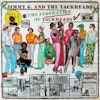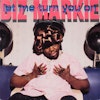The history of funk is not just knee deep, but contains many layers, beginning with James Brown wailing soulfully as booming bass, drums, and guitars roar behind him. A few years later, the gritty Black noise slowly transformed from the gutbucket of Brown’s brand-new bag to the Afro-intergalactic vibe of spaceman conceptualist George Clinton and his musical astronauts. After launching Funkadelic in 1970, Clinton and his collaborators explored the musical cosmos under various names that included Parliament, Funkadelic, Bootsy’s Rubber Band, the Brides of Funkenstein, the Horny Horns, Parlet, and numerous others.
In an unprecedented arrangement that years later inspired the Wu-Tang model, Clinton and company spread their music between various major labels that included Westbound, Warner Brothers, and Casablanca Records. Many of the same players (keyboardists Junie Morrison and Bernie Worrell, guitarists DeWayne McKnight and Garry “Starchild” Shider, bassist Bootsy Collins, and vocalist Robert “P-Nut” Johnson) played on almost every project.
In 1980, Brother George signed an exclusive label deal with CBS Records and launched Uncle Jam Records where Sweat Band, Philippe Wynne, and Zapp were part of the roster. After Zapp leader Roger Troutman jumped ship before releasing the group’s album, CBS, believing that it was all a Clinton double-cross, kicked the crew to the curb. By 1981, there were more than few record companies and fans that wrote Clinton off as a “has been.” Of course, you can’t keep a great team down and the funk mob resurfaced in 1982 at the label of Elvis, the Beatles, and the Beach Boys—Capitol Records, where they attempted a return to the groove dominance they held down a decade before.
Still, by the early ’80s, new kids on the funk block Rick James, Prince, the GAP Band, Cameo, and others were the main funk stars both on the radio and the road, but Clinton was determined to call it a comeback. In 1982, he recorded under his own name for the first time. His solo album Computer Games, which featured the brilliant career-saving single and club hit “Atomic Dog,” was released that November. Although the P-Funk players had utilized electronic technology instrumentation in the ’70s, by the new decade synthesizers and drum machines became a more prominent part of Clinton’s soundscape, exemplified by Computer Games.
Three years later, Clinton began spreading his wings, working with folks outside his regular circle, including wild white boys the Red Hot Chili Peppers on their daring second album, Freaky Styley, and nerdy Brit synth kid Thomas Dolby on the not-that-good single “May the Cube Be with You,” but he still managed to make time for family when he helmed little brother Jimmy Giles’s debut project Federation of Tackheads, the sole album for his band Jimmy G. and the Tackheads. Jimmy G. sang lead, played bass, and programmed the drums while Clinton teamed up with multi-instrumentalist Steve Washington, formerly of Dayton funk darlings Slave and Aurra, to cowrite and coproduce tracks for the collective.
The Jimmy G. joint was Washington’s first outing in P-Funk land, and Federation of Tackheads was a worthy companion to the collective’s yesteryear classics. New York Times music columnist Robert Palmer wrote, “Federation of Tackheads…find the avatar of funk (Clinton) working more comfortably with today’s electronic hardware…working with drum machines, sequencers and other hardware seems to have expanded Mr. Clinton’s musical horizons.” Though some purists complained that the funk was compromised and not as heavy, for me, the electro flow didn’t stand in the way of Jimmy G. and the Tackheads exhibiting the soulful flamboyance fans expected from Uncle Jam’s fellowship. Hell, even the usually hard to please “Dean” Robert Christgau gave the album a B+.
Coming at a time when Prince was king, there are a few musical shout-outs to the Minneapolis sound, most notably on the single “Break My Heart,” which also has a crazy call-to-Africa conga drum solo that’s perfect, and the raunchy “I Want Your Daughter,” which had a rowdy jam quality of the first two Time albums. Both songs are danceable, though “Break My Heart” has a post-disco vibe and “I Want Your Daughter” was more in tune with the new wave kids.
Everybody and your mama knows how much George Clinton inspired the Purple Man, so let’s just say that the influence has gone full circle. While the P-formula had always been about avant-garde rawness, sweaty freedom, and Menthol cigarettes, I would guess that part of the plan of bringing in Steve Washington was to acquire a producer whose sound might be able to get their songs on the radio in a dominant way. Though Slave was funky, their music was crisp and shiny, with tracks like “Watching You” and “Just a Touch” in heavy rotation on the airwaves. The most obvious radio choice on The Federation of Tackheads was the ballad “All or Nothing,” where Tackhead tried to balance full-moon yearning and werewolf howls.
Yet, while the music started off sounding like the velveteen soul of Atlantic Starr or S.O.S. Band might’ve recorded, minutes into the song the band changed up the groove as Jimmy G.’s vocals sounded like Teddy Pendergrass and Screaming Jay Hawkins battling at the crossroads as Garry Shider’s romantic rock guitar floated above like a beautiful black cloud. Shider’s solo was reminiscent of Ernie Isley’s electric passion on those old Isley Brothers ballads.
Tackhead was at their most funky on the opening “Clockwork,” a track that brought to mind a million Black family reunion line dances, and the closing slap bass of “Family Funk.” The album was hot, but the new age of funk didn’t have time for this motley crew of musical misfits who could obviously jam, but still weren’t quite ready to compete.
Later, Steve Washington contributed to other George Clinton projects on CBS including 1986’s R&B Skeletons in the Closet (“Do Fries Go with That Shake,” “Hey Good Lookin’”) and the Paisley Park–sponsored The Cinderella Theory from 1989 (“French Kiss”), but they didn’t get radio play either. Little Brother Jimmy G. also contributed to a few other projects including Incorporated Thang Band, who were originally called Tackhead.
Giles died in November 2019. Thirty-five years after the pleasure-inducing The Federation of Tackheads was released, the slept-on disc has fallen through the cracks of funk history. Though they’re damn near forgotten, Jimmy G. and the Tackheads deserve to be revisited, reevaluated, and recharged in the boogie-down canon.


